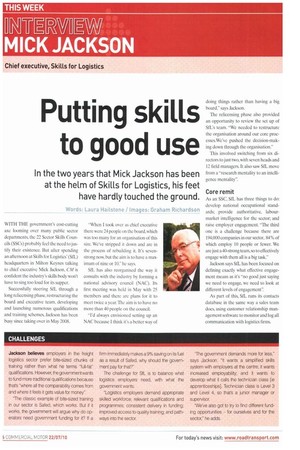CHALLENGES
Page 16

If you've noticed an error in this article please click here to report it so we can fix it.
Jackson believes employers in the freight logistics sector prefer bite-sized chunks of training rather than what he terms "full-fat" qualifications. However, the government wants to fund more traditional qualifications because that's "where all the comparability comes from and where it feels it gets value for money",
"The classic example of bite-sized training in our sector is Sated, which works, But if it works, the government will argue why do operators need government funding for it? If a firm immediately makes a 9% saving on its fuel as a result of Safed, why should the government pay for that?"
The challenge for Sf L is to balance what logistics employers need, with what the government wants.
'Logistics employers demand appropriate skilled workforce; relevant qualifications and programmes; consistent delivery in funding; improved access to quality training; and pathways into the sector.
'The government demands more for less." says Jackson. "It wants a simplified skills system with employers at the centre: it wants increased employability; and it wants to develop what it calls the technician class re apprenticeships]. Technician class is Level 3 and Level 4, so that's a junior manager or supervisor.
"We've also got to try to find different funding opportunities for ourselves and for the sector," he adds
























































































































